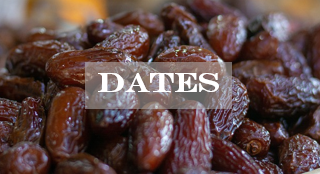 They are wrinkly, brown and their chewy texture is sweet and satisfying.
They are wrinkly, brown and their chewy texture is sweet and satisfying.
And, they are not raisins!
We are talking about dates…
and, for good reason,
they are our Superfood of the Month for April!
What are dates?
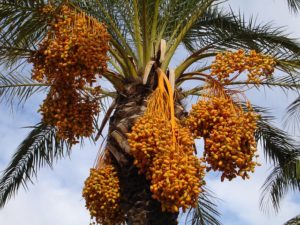 Dates are the fruit of a palm tree known as the date palm. They have been a staple food in the Middle East for thousands of years, and today the largest producers of dates are the Middle East and North Africa. There is some production in the U.S., mostly in California, where there is sufficient heat and water. It can take 4-8 years after planting before date palms bear fruit, and they often start producing yields for commercial harvest in 7-10 years. Mature palms can produce up to 300 lbs of dates per season and require multiple harvests since they don’t all ripen at the same time.
Dates are the fruit of a palm tree known as the date palm. They have been a staple food in the Middle East for thousands of years, and today the largest producers of dates are the Middle East and North Africa. There is some production in the U.S., mostly in California, where there is sufficient heat and water. It can take 4-8 years after planting before date palms bear fruit, and they often start producing yields for commercial harvest in 7-10 years. Mature palms can produce up to 300 lbs of dates per season and require multiple harvests since they don’t all ripen at the same time.
There are over 200 varieties of dates. They are typically grown to be 1-2 inches long. Most are brown, but some varieties can turn bright red to bright yellow when ripe. Dates contain a single stone, or pit, that can be up to one inch long.
What are the most common types of dates?
By far, the most common dates in the U.S. are the Medjool and Deglet Noor varieties:
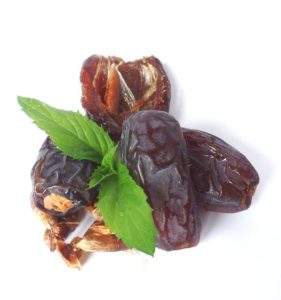 Medjool Dates: these dates are the ones you typically find in the plastic containers in the produce section of your store (or at the farmers’ market in California when in-season). They are somewhat larger than other varieties and are softer and sweeter, making them ideal to use in smoothies, granola bars or energy bites.
Medjool Dates: these dates are the ones you typically find in the plastic containers in the produce section of your store (or at the farmers’ market in California when in-season). They are somewhat larger than other varieties and are softer and sweeter, making them ideal to use in smoothies, granola bars or energy bites.
Some say they don’t work as well in baking because they contain more moisture and can be more difficult to cut evenly.
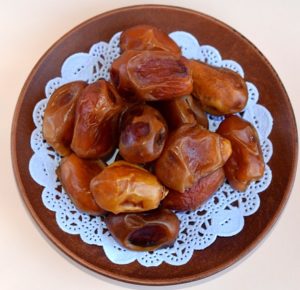 Deglet Noor: a great, less expensive, go-to option because they are common and easy to locate in the store (typically found by the raisins or other dried fruits, such as the brand Sunsweet).
Deglet Noor: a great, less expensive, go-to option because they are common and easy to locate in the store (typically found by the raisins or other dried fruits, such as the brand Sunsweet).
Deglet Noor dates are amber in color, chewier, and have a drier texture which makes them ideal as an all-purpose date. Two Medjool dates will equal about 3 Deglet Noor dates.
Pits removed?
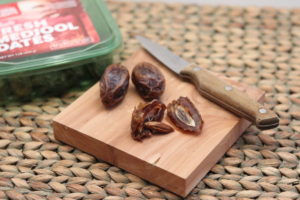 Dates naturally have pits inside them. The pits are hard and resemble a pecan. You don’t want to eat the pits (unless you feel like visiting your dentist for a broken tooth!). Don’t feel silly if you are unsure what “pitted” means on the package of dates…it simply means the pits have been removed.
Dates naturally have pits inside them. The pits are hard and resemble a pecan. You don’t want to eat the pits (unless you feel like visiting your dentist for a broken tooth!). Don’t feel silly if you are unsure what “pitted” means on the package of dates…it simply means the pits have been removed.
If the pits haven’t been removed, it is super-simple…you can either use your fingers to pull the date apart and the pit will easily come out, or you can use a paring knife to cut the date lengthwise to remove the pit.
 Why dates?
Why dates?
They may be small, but dates pack a ton of nutrition in one sweet little package:
- Potassium: essential for building muscle, regulating blood pressure, and protecting against stroke and heart disease.
- Fiber: you can get up to 6.4 g of fiber in just 4 dates, which can aid in digestion and keep you feeling full longer. Dietary fiber is also known to decrease cholesterol levels.
- Antioxidants: dates contain naturally occurring antioxidants known as polyphenols. They are known for their anti-inflammatory properties, and to help reduce cell damage.
- Substitute for refined sugar: dates are high in sugar, but are considered low on the glycemic index. Because of their fiber content, they don’t cause a huge spike in blood glucose. Dates can be excellent to use in place of refined sugars.
- Minerals: loaded with minerals such as calcium, selenium and manganese, dates help develop healthy and strong bones to fight off diseases like osteoporosis.
- Cure allergies: dates contain organic sulfur which can help reduce allergic reactions and seasonal allergies.
- Instant dessert: finish your meal with a convenient sweet treat! When else does your sweet tooth get satisfied and your blood pressure get tamed all at the same time?!
What can you do with dates?
There are limitless ways to enjoy dates…in both sweet and savory meals! Here are just a few of our favorite ideas:
 Salad topping! Chop dates and add them to a salad just like you would other dried fruit such as raisins or dried cranberries.
Salad topping! Chop dates and add them to a salad just like you would other dried fruit such as raisins or dried cranberries.- Sugar alternative! Use date sugar as a replacement for brown sugar or coconut sugar. Because date sugar is simply granulated dried dates, it retains the beneficial nutrients including the antioxidants and fiber.
- Sweeten your smoothie! Add 1-2 dates to your smoothie to add sweetness instead of honey or pure maple syrup.
- Snack time! Dates act like a wonderful natural binder and are ideal to use in the Almond Butter Bites, or to add to homemade granola or trail mix.
- Flavor your overnight oatmeal! We love using dates in the Carrot Cake Overnight Oatmeal!
- Make date paste! Try making date paste such as in the Chocolate Granola Bars or make up a batch of date paste, let it cool, store it in the refrigerator and spread it on anything!
Here are just a few delicious ways to enjoy dates:
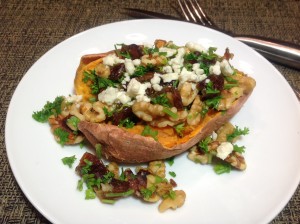 Moroccan Salad with Cilantro Orange Dressing
Moroccan Salad with Cilantro Orange Dressing
Stuffed Sweet Potatoes with Dates, Walnuts, and Gorgonzola
Sliced Apples with Date Caramel Apple Dip
Do you need to refrigerate dates?
Although dates are dried, they are usually not completely dehydrated like other dried fruits such as raisins or cranberries. Since they still contain some moisture, it is a good idea to store them in a cool dry place or 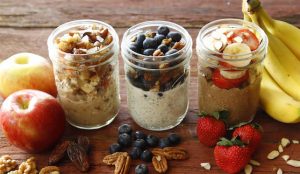 in the refrigerator. Kept in the refrigerator, they will keep well for at least 6 months, and can be frozen for up to one year.
in the refrigerator. Kept in the refrigerator, they will keep well for at least 6 months, and can be frozen for up to one year.
Note: occasionally dates will develop white spots on them. But, don’t worry, this is likely just the natural sugar crystalizing on the surface of the dates…they are still perfectly fine to eat!
Take our Superfood Challenge!
Try dates in different ways during the month of April and see what you think! Then, please share your successes with us!

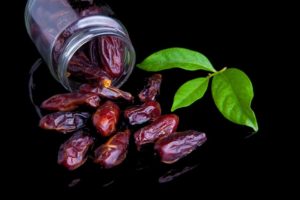
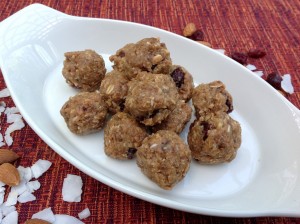
Leave A Comment